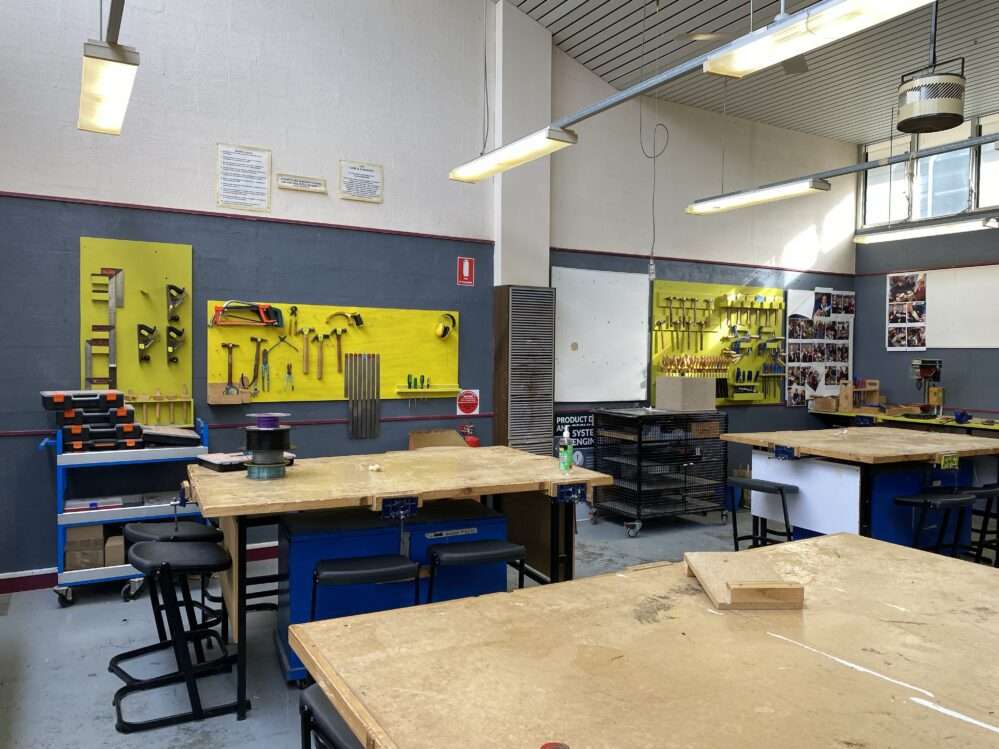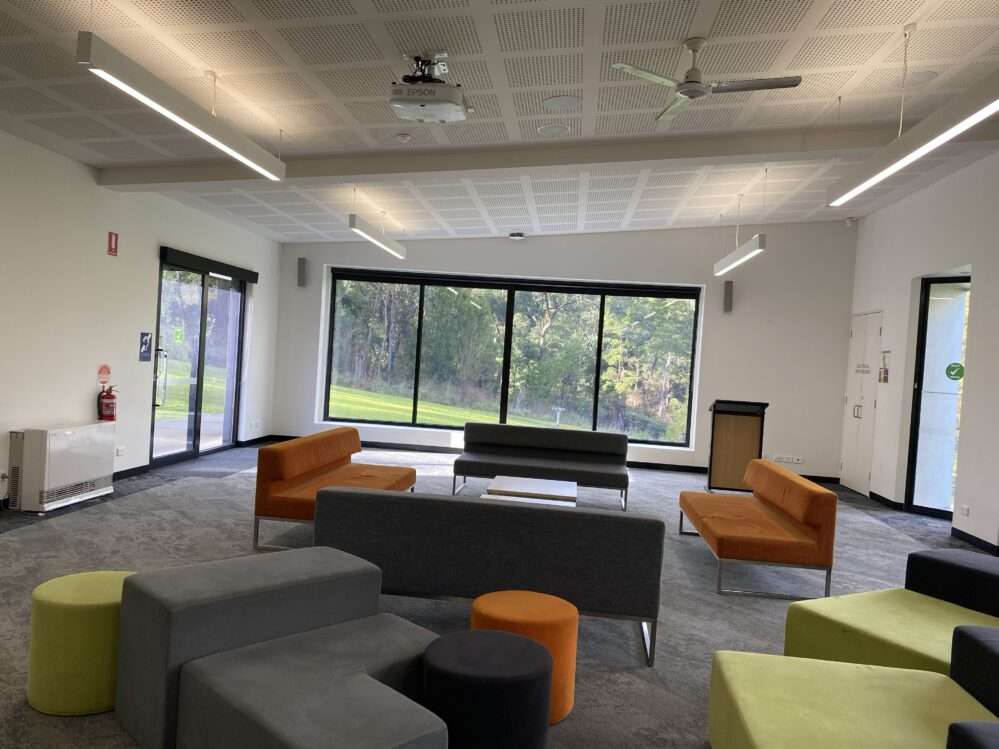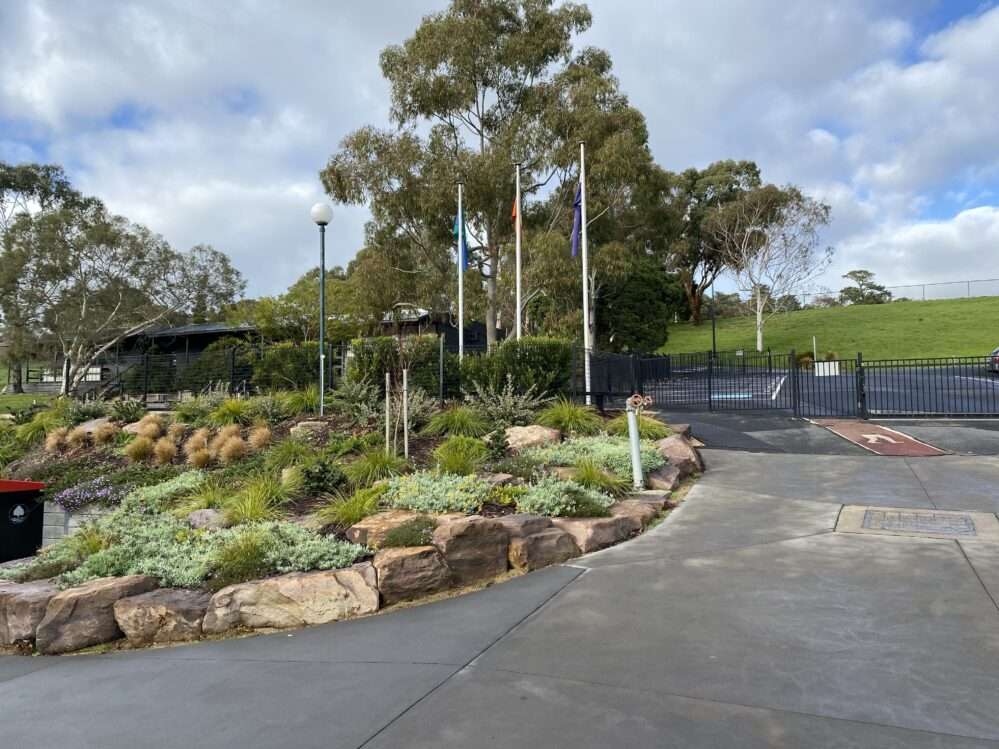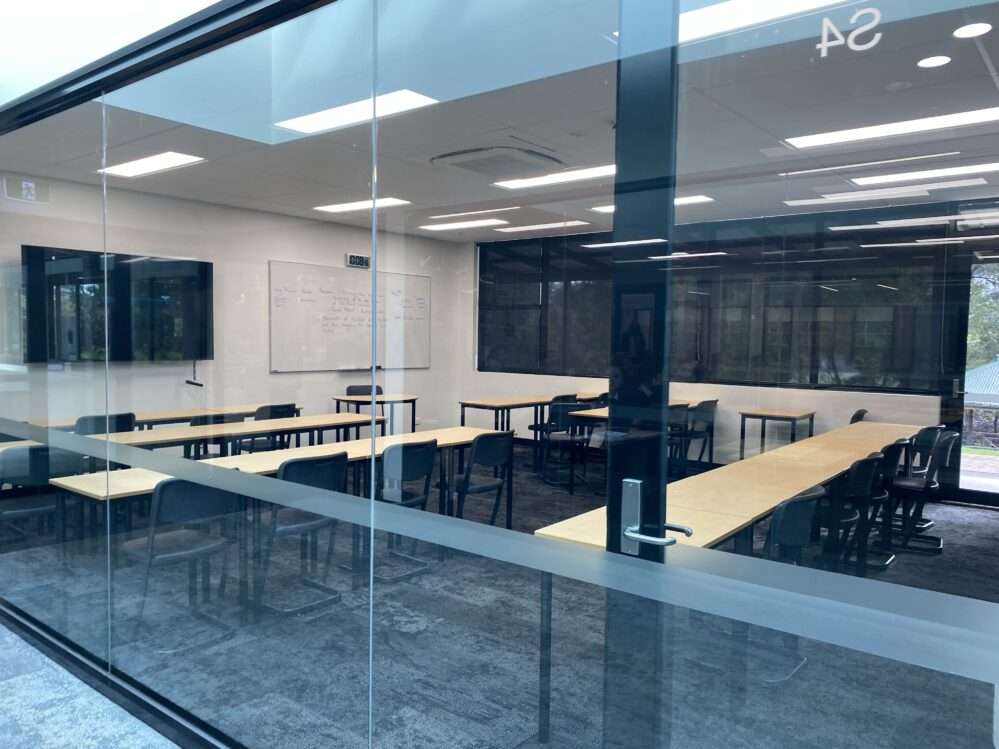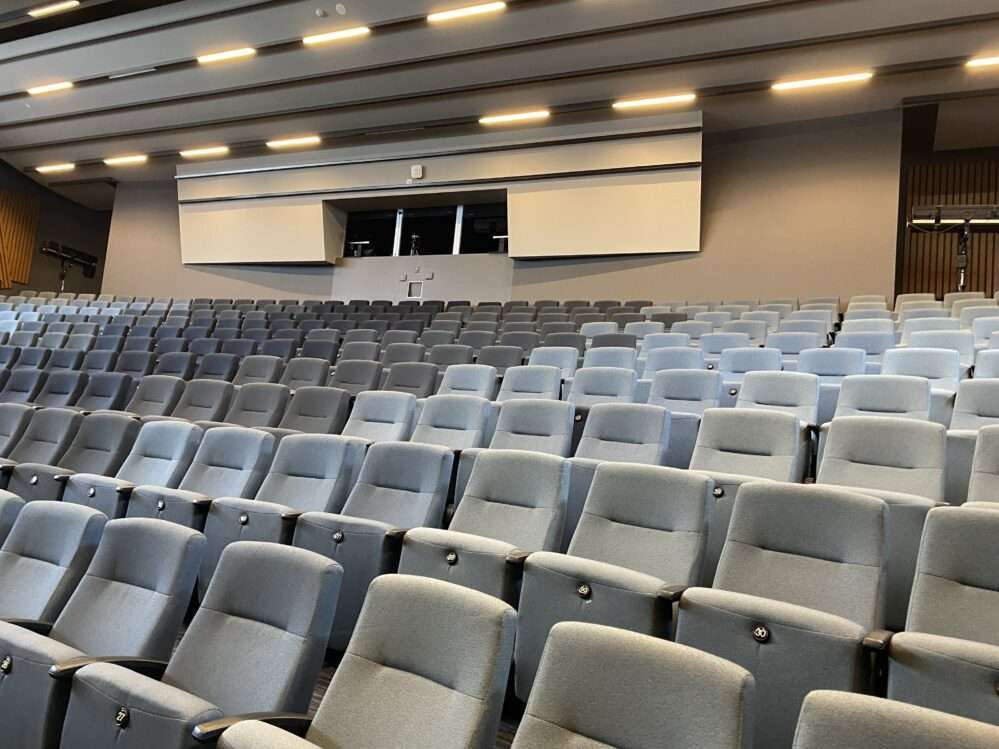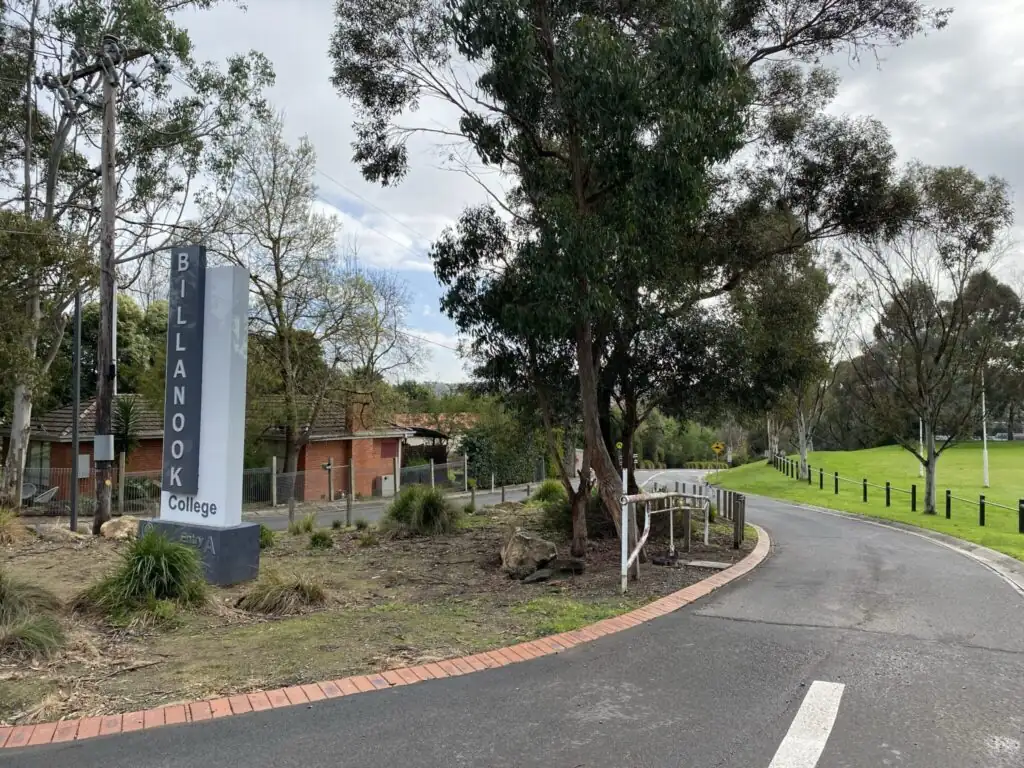I encourage you to personally tour the school and meet the educators and students, form your own opinion and leave a comment here.
Best of luck with your search for the perfect school!
Tour Details
Vibe at Billanook College
Billanook is set quite far out East in Mooroolbark. The campus feels secluded, calm and tranquil. Large trees and nature surround the grounds. A little creek runs through the campus and they even have their own resident kookaburra family living on site so it feels almost like a bush retreat.
💡 Did you know Billanook College is in the top 100 Melbourne schools? See our top 100 schools article
Campus facilities don’t feel overly showy or fancy. The building are reasonably modern and clean with mostly glass classrooms and a common, open area between the rows of classroom. The classroom areas, especially for senior students were incredibly quiet and calm and students were seen quietly listening to their classroom teachers or working with an aide.
There are only about 800 students from ELC to 12, so quite a small number of students despite being on relatively large grounds.
Billanook stood out to me as a school that has very strong pastoral care. Nick seemed to know the students on tour well, not only them but their families too. There seems to be a strong sense of community. One of the other staff members I spoke with, was a past student at the school who will be sending her own children there. A real testament to the positive sentiment she had towards her school and education.
The school seems to put a lot of effort into catering for every kind of diversity from gender neutral toilets to the Dame Phyllis Frost Centre which is a learning support center for students with diverse learning needs.
Nick spoke about the culture of honouring each child’s unique abilities and supporting them to learn how they are best suited to learn. He mentioned the flexibility in the school to cater for the unique needs for students. He said that there is flexibility in the system that is often not mentioned at other schools. He brought up an example of a girl who required accelerated year 12 German in year 10, equine studies at Box Hill, year 11 biology in year 10 and only 3 subjects in year 12 which they worked with her to accommodate in timetabling and logistics.
View full gallery here.
Years 7 – 9 at Billanook College
A point of difference in years 7 and 9 at Billanook is the Head of Year travels from Year 7 to Year 8 and 9 with the same cohort of students. This is to maintain a deep level of understanding, community and pastoral care during these transitional years. The Head of Year has offices right outside the Year 7 – 9 classrooms and is a student’s and family’s first port of call for any social or emotional issues.
Pastoral care then shifts to another Head of Year when they enter Year 10.
There are usually 4 to 5 Year 7 classes each year. According to the students on the tour there isn’t a lot of homework in Year 7, just work that hasn’t been finished in class.
Mastery / Discovery / Journey framework in middle school
Framework of learning in middle school ( years 7-10 ) is divided into Mastery, Discovery and Journey.
Mastery
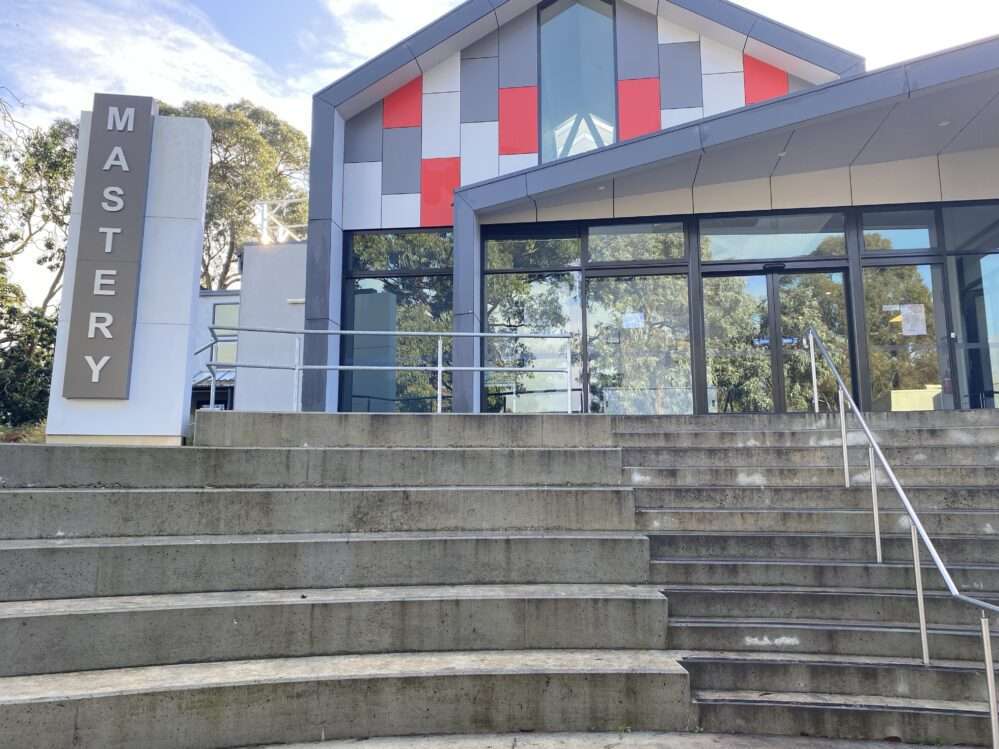
Mastery is the traditional academic subjects such as maths, English and science – content heavy and discipline based – the “gateway to tertiary studies” .
Discovery
Discovery is a timetabled subject in middle school that is more self directed and allows students to follow their passions and teaches some life skills and problem solving.
Nick lead us into a building specifically for Discovery learning. He explained that it’s a framework that’s designed to reverse some of the more traditional teaching.
An example of a Discovery exercise is “$20 boss” where students are given $20 to start a small business with the goal of teaching entrepreneurship and financial literacy. Students make and sell products at the Father’s Day stall and profits are donated.
In the past students have sold artwork, honey, candles, T-shirts. Apparently one past student made a $50 000 per annum business during the program and ended up leaving school in year 11 to start his own enterprise!
Students on the tour spoke about a couple of other Discovery learning subjects. One involved a project thinking what is was to live a “good life”, encouraging them to think about what is important in life – money, kindness, service, compassion etc. This subject touched on ancient philosophical thinking such as stoicism.
Another project was thinking about the day in the life of a person that is inspiring to them eg. netballer, family, historical figure.
Journey
Journey is the framework that encompasses life skills and the “richness of life” as Nick explained. This includes camps, tours and experiences.
I asked Nick if students found it hard to shift their thinking back into straight VCE after having such a free flowing Discovery curriculum in middle school. He replied that Discovery teaches skills like problem solving and thinking skills so they don’t have issues transitioning back to more traditional teaching.
Science at Billanook College
We toured a science lab where I got to speak with the science teacher. Interestingly he said that the uptake of science is fair and improving. He said he had moved from another larger private school and enjoyed Billanook more because of its small, caring culture where he could spend more time helping and getting to know students.
Sport at Billanook College
Billanook is part of the EISM network.
From what I understand sport can be taken competitively or more for recreation and fitness. Although competitive opportunities are offered such as for volleyball, there are less competitive physical activity opportunities such as Pilates and cardio fitness.
Billanook has a very strong volleyball team. The coach is passionate and forms a boys team and a girls team that compete successfully in the nationals competition each year.
Speaking one of the staff after the tour ( who was also a Billanook student ), she said that sport is encouraged but not forced on students.
Neurodiversity and Dame Phyllis Frost Center at Billanook College
The Dame Phyllis Frost Center ( The DPFC ) is situated in the middle of campus and is a center that supports the diverse learning needs of students. Nick said at the DPFC they seek to improve the functional needs of students, regardless of diagnosis by providing customised assistance. The assistance he mentioned may be scribes, clarifiers, OTs, speech pathology even respite. The DPFC is intentionally situated in the middle of the campus, not hidden away, as a reminder that all learners are valuable and that everyone learns things in a different way and at different rates. The kinds of students he mentioned they supported included students with dyscalculia, Autism and ADHD.
One of the students on the tour said that her brother had ADHD and found the center very helpful. She said that she had moved from another private school and preferred Billanook partly because of the support they gave her brother.
There is a Head of DPSC at Billanook.
When I spoke with a staff member after the tour, she mentioned that they do take in students with all kinds of neurodiversity, however they need to know that they can support your child’s needs. The best thing to do is to make an appointment to speak with the Head of DPFC if this is your situation and you are considering Billanook.
Other kinds of diversity and wellbeing at Billanook College
Billanook seems to have a very progressive culture. Their newer buildings less than 10 years old have unisex toilets to cater for gender fluid / trans kids who will have “one less issue to think about” when choosing a bathroom. It’s something Nick says was really thought about when building the new buildings and has proved to work extremely well.
There is a registered nurse on site as well as an educational psychologist.
Mobile phone policy at Billanook
I asked one of the students about mobile phones and he said that the teachers “prefer that you don’t use them”, but aren’t too strict about it. Students can use phones during lunch times and recess. He also said it depends on the teacher as some teachers are stricter about it than others.
Clubs
One of the students said that there were a few but not many clubs at the school. Fencing club was one he mentioned.
Student comments ( paraphrased )
- “ What I like most about the school is the friends I’ve made”
- “ We have good relationships with the teachers ”
- “ My brother has ADHD. We moved from another private school and they have really helped him here at DPFC. “
- “ I feel like they are really interested in helping you get where you want, whereas in my last school they wanted me to do things that made them look good like maths competitions.”
Final words
Billanook seems like a school that tries to honour the individual student. They are not a large school in terms of student numbers and seem to be able to go out of their way to support and honour what individual students want and need. Their facilities aren’t the biggest or the fanciest, but the environment seems very calming, quiet and tranquil being out in nature.
Billanook invests a lot in accommodating diversity of any kind, but especially neurodiversity with a specialised center dedicated to learning support and a Head of DPFC. There seems to be a strong sense of pastoral care. I have the feel teachers really know the students and the families that go there well and this translates into a sense of community.
I have to make a special mention of Nick Owen ( Head of Middle School ) who was extremely accommodating when he saw me taking photos of the school. Not only did he not object or make me feel awkward about it, he asked students to take me out of the tour’s way and wait for me to take photos. I felt very cared and accommodated for as a guest. I’m guessing this speaks to how accommodating they would be for students who attend too.
Do you have any experience, questions or comments about this school? Let our community know and add a comment below. We’d love to hear from you!



